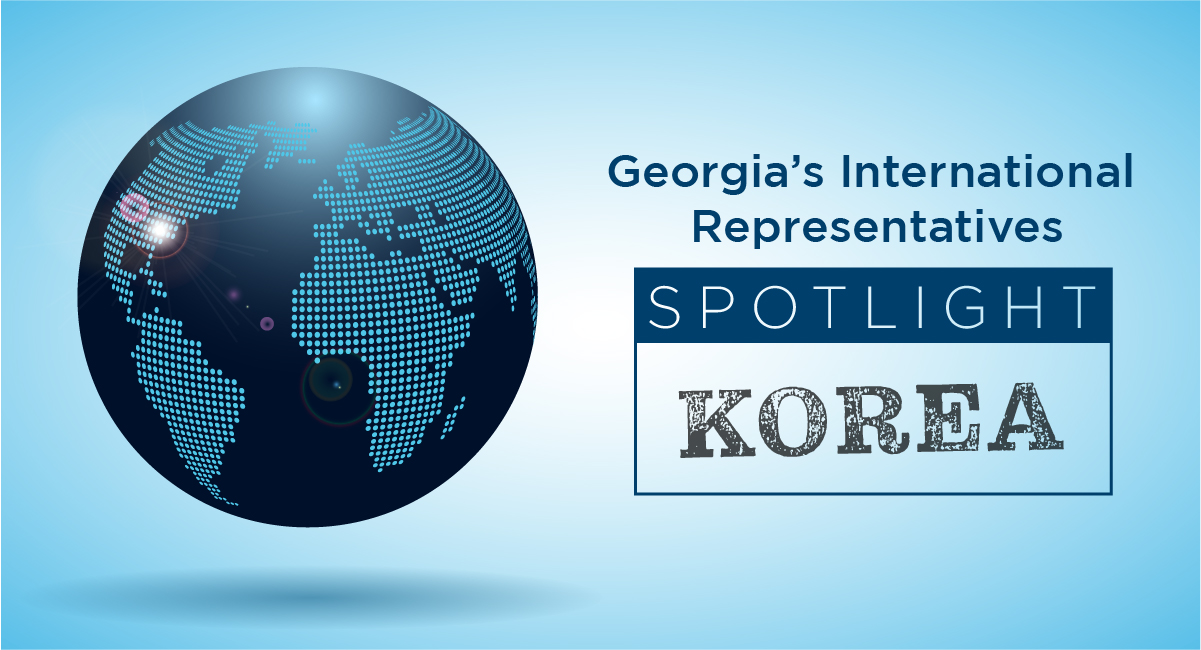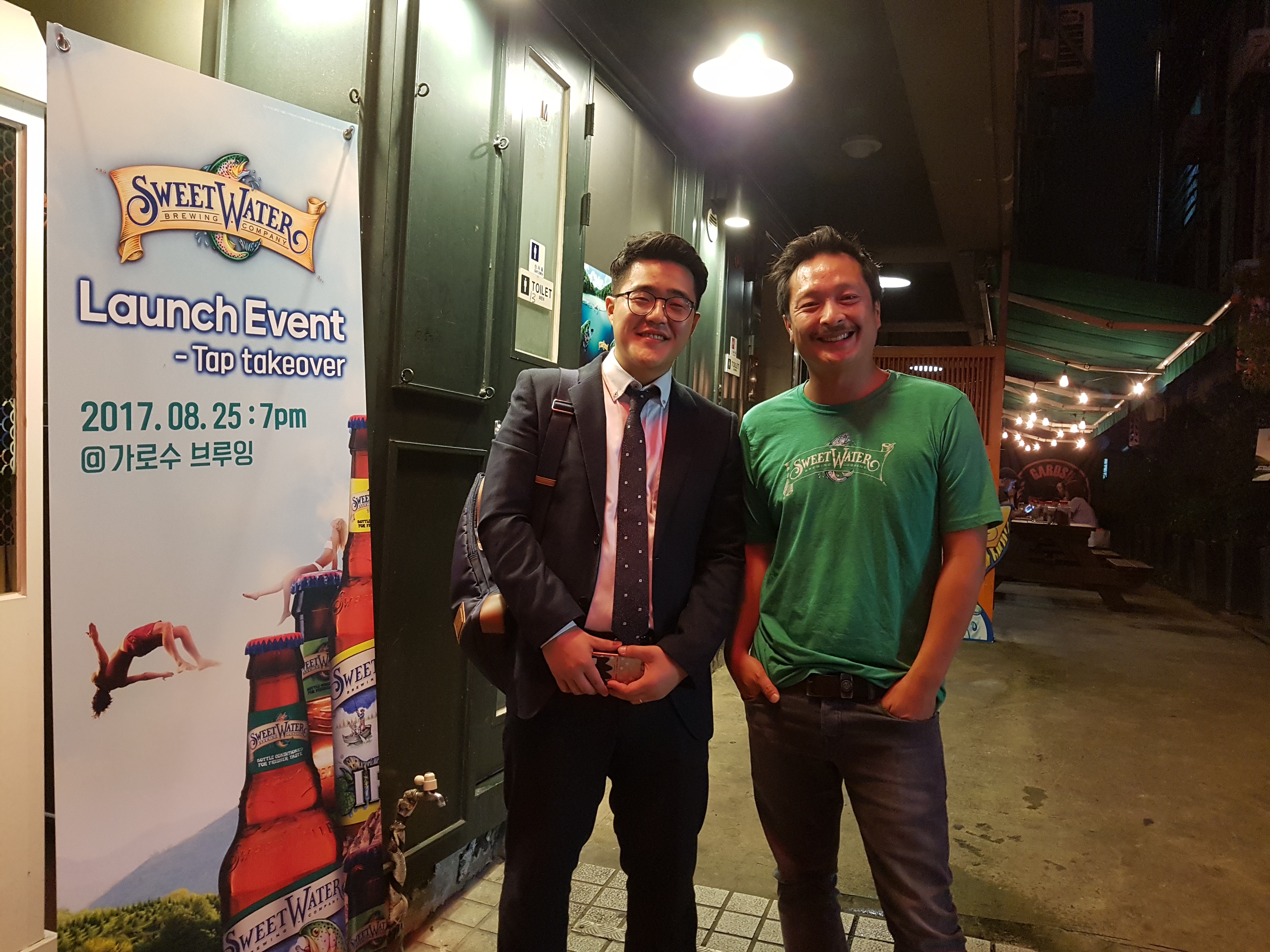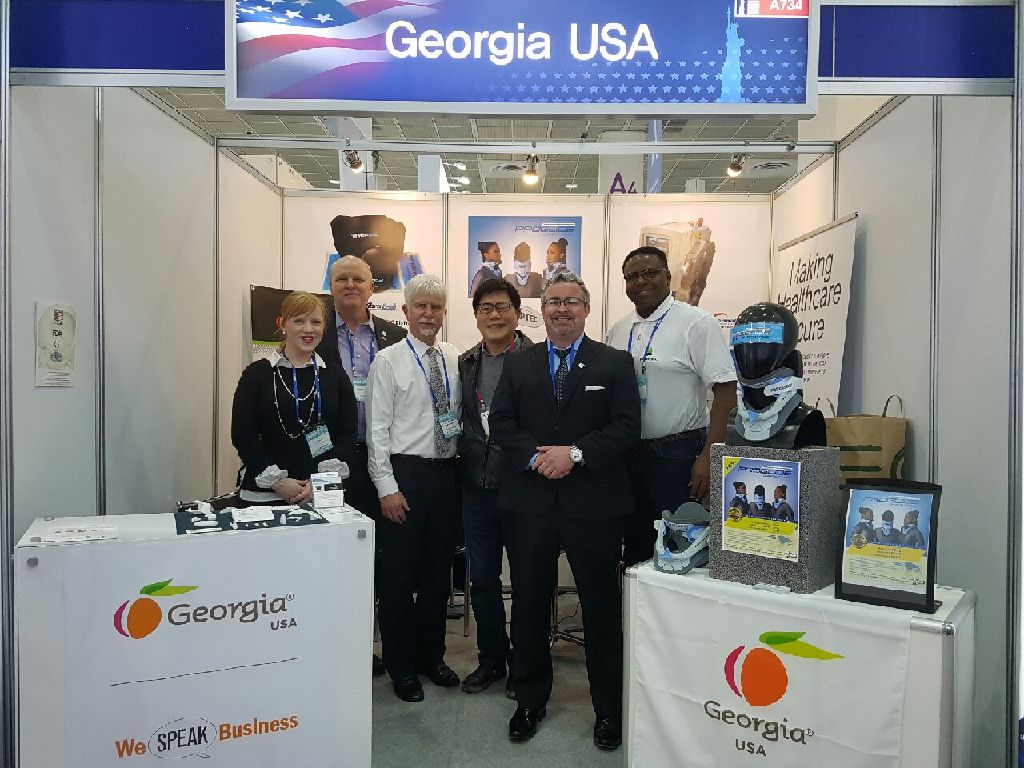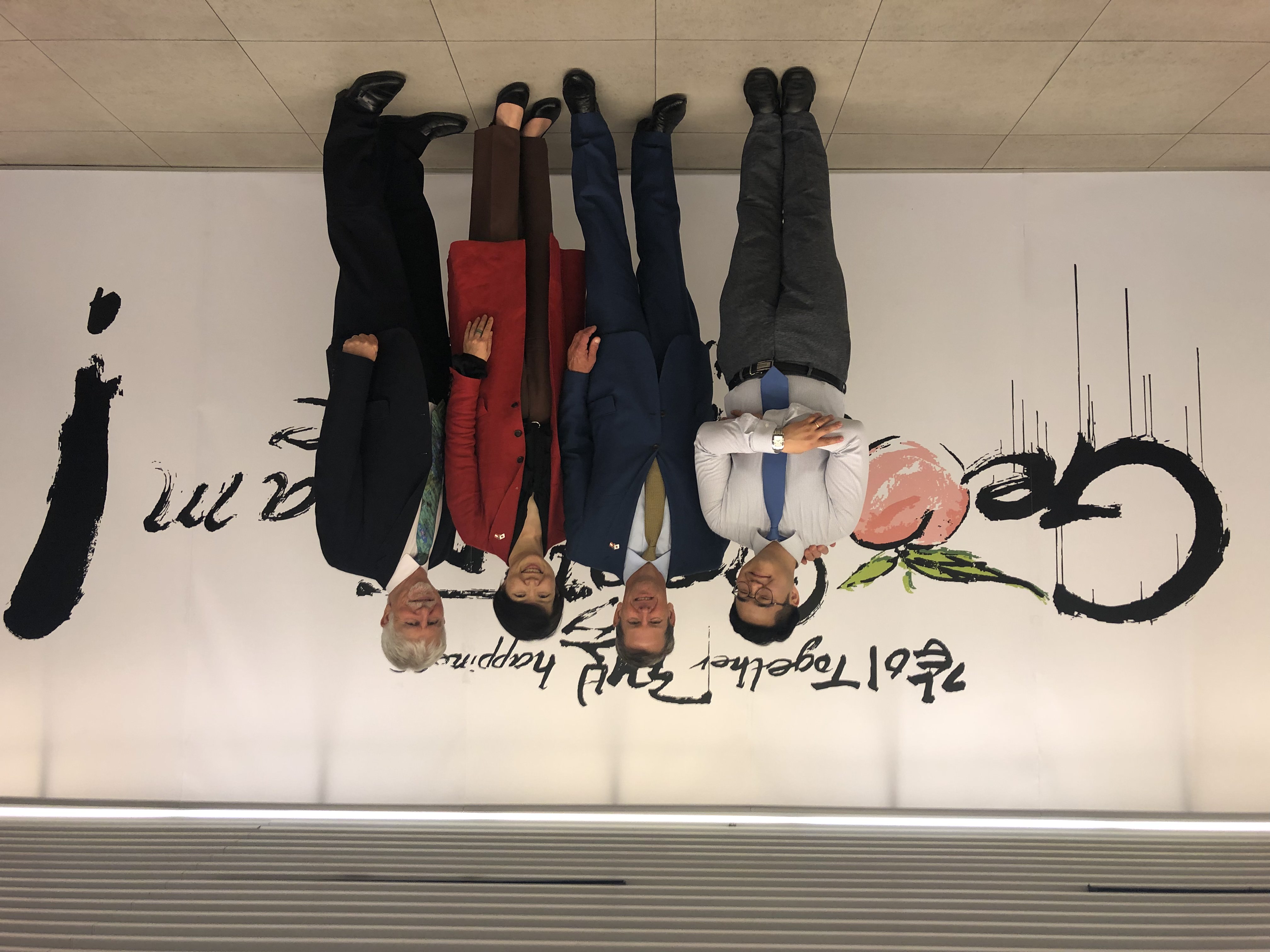
International Representative Spotlight: Korea

Interviewee Name(s) & Title(s):
Peter Underwood, Managing Director
Seunghun (Jacob) Lee, Trade Representative
Where is the office based: We are based in the center of Seoul. The U.S. Embassy is right next door, as is the Seoul City Hall.
How did you enter the world of exporting/trade and how long have you been working in this field?
Peter – I can speak to the company and Jacob can talk about his experience in trade. We first established the contract in 1985 primarily representing Georgia on the foreign investment side. We have had trade responsibilities and roles off and on over the years but we signed a separate trade contract in 2015. That’s when we brought Jacob on board to manage the trade aspect of our contract.
Jacob – I’ve been in the international trade field for about 6 years now and previously worked as an international sales representative for a Korean manufacturing company. My interest in international trade really developed out of my experience at international trade shows. I loved meeting and talking with people from all over the world to understand their business needs, hear their different perspectives, and ultimately help them understand the Korean market better. Many of the companies and people I came across weren’t particularly aware of the nuances in the Korean market, so I really enjoyed getting to introduce people to Korea.
 What typical services do you provide for Georgia exporters interested in your market?
What typical services do you provide for Georgia exporters interested in your market?
Jacob - We mainly provide market research for companies interested in exploring business opportunities in Korea. This research is what we call an initial market assessment, or IMA, which looks at a specific item or industry and its potential in the Korean market. Often times companies turn to us for assistance in identifying local partners or customers. Companies may also require specific information on Korean regulations or to resolve challenges they are facing in doing business here.
What do you consider the biggest challenge(s) to exporters interested in your market?
J – The Korean business environment can be very different from the US, which may be a challenge to companies at first. There are distinct linguistic, cultural, and customer expectations and differences that need to be understood, all on top of a sizeable time difference. The biggest challenge most exporters encounter though tends to be what we call the “values conflict.” Korea is very much a group values based nation where personal relationships take precedence over, for instance, strictly profit motivated decision-making. Some believe the primacy of relationships is a remnant of Korea’s agrarian past, where relationships and strong group collaboration ensured the limited rice growing season would yield enough for everyone. To that end, it is important to understand the dynamics and nuances of relationship-building in Korea.
Saving face and maintaining your reputation are very important aspects of relationships in Korea. To “save face” ,Chae Myun in Korean, and avoid unintentionally insulting others, Koreans frequently use indirect, non-verbal expressions. These cues may be misinterpreted as indecision or uncertainty, when in fact they are common ways Koreans communicate to save face. This non-verbal communication sometimes says more than if someone were to speak directly.
P – Jacob really outlined the main challenges: language and the Korean communication style are of course particularly important ones. Many Koreans also know English, especially those in trade, though they may be more comfortable using and speaking Korean instead. The time difference along with the physical distance from Korea really need to be taken into consideration as well.
Jacob introduced the group value concept in Korean culture, and I think its importance can’t be overstated. Business decisions in Korea are made based on relationships rather than hard dollar value or profit valuation. You could have a product that is better and cheaper, and yet the Korean buyer will choose another product for ambiguous reasons that may not make sense to the U.S. seller. It comes back to the primacy of group collaboration and group values, doing what helps the group advance its prosperity rather than the individual. If a company is aware of this phenomenon, it can adapt its approach and messages. The problem is that most “Western” companies don’t even know about or understand these cultural nuances and as a result frequently trip up trade deals or compromise business relationships. The solution is to invest in relationships; just as you enhance your professional skills, working on your relationships in Korea is an essential part of doing business here.
What makes doing business easier?
J – Korea is a very concentrated market with over 50% of the population living and working in the Seoul metropolitan area. As a result, the logistics and infrastructure to support or transport your product are very accessible compared to geographically larger countries. Korea is also a gateway to Asia and the Korean market often has consumers that are early adapters or trend-setters. If you can be successful in Korea, it may be easier to penetrate other markets in the region.
 Are there any major trade shows in your market that GA exporters should be aware of?
Are there any major trade shows in your market that GA exporters should be aware of?
J – When we discuss business opportunities in Korea, we usually mention 5 particular industries: medical, food and beverages, cosmetics, IT, and business services. For the medical industry, the leading show is KIMES. For food and beverage, we usually attend Food Week Korea, which is actually composed of many different food and beverage shows (Food Industry Technology Show, Seoul International Bakery Fair) taking place concurrently. For cosmetics we attend Cosmobeauty Seoul. In the IT sector there are a wide range of shows that take place throughout the year…we can provide more specific information depending on the interests and specialization of the Georgia company. There are other major industry focused trade shows. The EV battery industry is a key growth sector in Korea and we recently attended InterBattery Seoul.
P – The medical industry is of course quite broad and can include anything from devices to software. It is important to bear in mind that the latter can be difficult to market in Korea due to language barriers. Korea provides universal healthcare and has a high dependence on imported medical products, so Georgia companies in the medical industry may find a great numbers of business opportunities here. Once every two years there is also the Korea Air Show.
What is the trade relationship between the U.S. and your market like?
J – The overall relationship between the U.S. and Korea is very strong, with the U.S. presence in Korea being well established. There are deep ties with Georgia as well given that the state has the third largest Korean community in the U.S. On the trade side, the U.S. is Korea’s 3rd largest trading partner and Korea is Georgia’s 12th largest trading partner. The existence of a free trade agreement (FTA) also reflects the strong relationship.
P – Korea is a very trade dependent nation. At its peak in 2011, trade made up 86% of the Korean GDP. That figure is currently around 63%. For context, trade in the U.S. makes up only around 26% of the GDP. Whereas in the U.S. the domestic market is very important, for Korea the international market is critical. Also keep in mind that while the FTA is a big advantage, it does not automatically eliminate tariffs. Most products from the U.S. are eligible for tariff reduction, but this requires completing the necessary paperwork before your goods arrive at Korean customs. I should also mention that Korea is probably the most pro-America country in Asia.
Are there any trends, be it in policy, culture, or consumption habits that exporters should be aware of when considering the market?
J – Trends in Korea generally move with the global ones, such as the move towards renewables and focusing on sustainability. Global competition makes the market very competitive and importers can be very picky, so bringing something new and unique is important. Korea is also a fast-paced market where products can experience rapid growth and popularity one day, only to be replaced by another product the next day as interests change and fads dissipate. When Koreans want something, they want it very quickly and make every effort to get it. Direct overseas purchasing is growing rapidly as Koreans will not wait until the product is officially imported. Korean consumers are very comfortable buying from foreign shopping malls. Another factor for purchasing direct overseas is price sensitivity; companies may need to educate the consumer on why they should choose a certain product, especially when imports are more expensive than local products. Customer service is expected to be easy, streamlined, and most importantly, always erring on the side of the customer.
P – There can be hidden regulations that, correctly or incorrectly, are perceived as being non-tariff barriers. Nonetheless, trade is really driven by consumer demands, interests, and tastes that are more important than policy per se. For example, the demand for organic food is growing rapidly in Korea. There is some consumer skepticism about claims though, especially where organic is concerned, due to instances of false and misleading marketing. As a result, companies need to invest in educating consumers on the product’s quality. Additionally, Korean consumers won’t really purchase GMO products. These products are required to be labeled and though consumers may not really be concerned about the products themselves, they are concerned with how they will be perceived by others if they buy GMO products. This relates back to the concept of face and the importance of saving face.
As Jacob introduced, I like to call the rapid rise and decline of a product “flash and crash.” These products become very popular, but will usually fall very quickly, so it’s key to sell fast and know the demand may be short-lived. It is also worth mentioning that the internet community in Korea can quickly ruin public image, especially in sharing unsatisfactory customer service experiences. There is an expectation that companies, whether they are in the right or in the wrong, assume responsibility and side in favor of the consumers.
 Tell us about a memorable time when you were able to help a Georgia company avoid or overcome a major pitfall in your market? What was the situation and what do you want other companies to learn from this?
Tell us about a memorable time when you were able to help a Georgia company avoid or overcome a major pitfall in your market? What was the situation and what do you want other companies to learn from this?
J – One of my most memorable experiences was with a delegation that came from the U.S. for KIMES. Before attending the show, we connected the delegation with a number of Korean government officials and experts who prepared meetings with potential clients in Korea. I noticed a major, positive difference in their ability to network and navigate the cultural nuances.
P – A number of years ago I was working with a beer brand selling to Korea. For whatever reason, when they packed cases of beer on their pallets, they used pallets made of cardboard. When the beer shipment arrived in Korea after a journey around the world, the container was leaking beer. Our job was to inspect the container when it was opened, because the exporter didn’t believe there was an issue with the shipment. Upon breaking the seal, beer came pouring out and it was immediately evident that the pallets had been crushed along the journey. In that instance we were limited in how we could help the Georgia exporter – the damage had already been done. However, we were at least able to offer eyes on the ground and explain what was going on, because there was mistrust between the Georgia exporter and the Korean importer.
Beyond this very memorable experience though I’d have to say one of the ways we routinely provide value to quite a number of Georgia companies is by providing straightforward and accurate information about the market and regulations. Companies are frequently confused about what regulations really mean and that’s where we can help prepare them to determine if the Korean market is even viable from a regulatory standpoint.
What made the biggest impression on you when you visited Georgia?
J – My first impression was the warm welcome from all of the Georgia trade managers and clients that we met. It was truly Southern hospitality. I also love to take photos, which helps me explore a new city. I was last there during the football season, so there was a certain excitement and energy I came across while wandering through Atlanta and seeing the crowds headed to the stadium to watch the Bulldogs.
P – The “space” is always so impressive. There’s so much room and greenery, even when you’re making your way through metropolitan Atlanta. It’s incredible to be in a high-rise right in Midtown, only to see trees everywhere.

What do you enjoy most about representing Georgia in the Korean market?
J – When I see a Georgia product in a local store, it makes me feel very proud to have supported these companies and see their success in a very tangible way.
P – I think Georgia has really increased its presence and image in Korea. The general awareness of Georgia has grown in Korea and Korean business people are very much aware of the state now. In fact, Georgia is almost always on the list of Korean businesses looking to do business in the U.S. It’s been exciting to witness that transformation and the “rise” of Georgia in the eyes and minds of Koreans.
Do you have anything else you’d like to share?
P – I’d urge that companies with limited resources choose one or two markets and concentrate on them. Prioritize and get your presence in that market up and running before expanding further. Concentrate on your greatest opportunities. Korea is a market that runs on rapid interchange. What that means is that you need to respond to inquiries and communications from Koreans very quickly. If you don’t respond within a matter of days, companies interpret it as a lack of interest and they will not hesitate to move on. This doesn’t mean you can’t take your time to collect any information you need, but if it will take longer than three days it’s important to at least let your Korean contact know.
J – The market research is so critical. Understanding the regulations is key, especially as they can be time and money intensive. Learning about the regulations and approvals should be the first step before moving on to market assessments and business partner searches. Companies will want to make sure that the regulations won’t prevent the product from being imported. This is especially important for any product that is consumed into the body, such as food or medications.
###
Are you a Georgia business looking for help growing your international sales? Find out how Georgia’s International Trade Team can help at www.Georgia.org/Trade.
